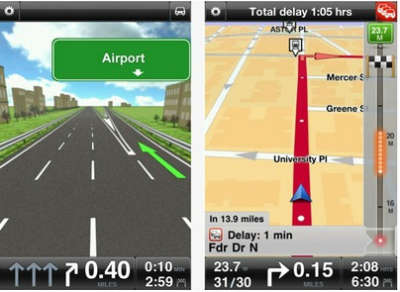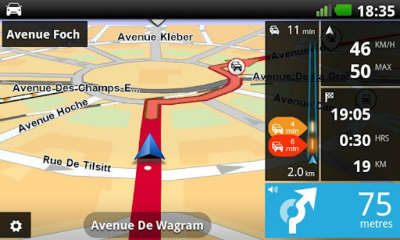Recently, TomTom brought out a TomTom navigation app for Android devices. And while the app itself is a good quality way to get around from point A to point B, it’s not without its own set of problems, including one particularly glaring matter that someone really should have seen before launch.
The app itself offers up a variety of quality features, the kind of which that would generally be expected out of a GPS navigation app from a major name like TomTom. Provision is made to track a trip with multiple stops along the way to a stop, as well as establish a route by the fastest route to get there or the shortest route to get there. Users can avoid specific motorways, and even track a walking route. Users can choose between 2D and 3D maps for their favorite kind of experience, can establish routes to their contacts, rapidly recalculate routes in the event of unexpected deviation from the originally planned route, and even a variety of versions available depending on the location of the map you’re after. The app will even automatically switch between day and night modes for the best visibility.

The inclusion of walking route tracking is the kind of thing that doesn’t often show up in navigation apps, so for those who go from the car to on foot on a regular basis–which happens quite a bit in larger cities–it’s a welcome development. In fact, there’s a lot about TomTom Navigation that can be described as good. The layout is good, the setup is good. It’s easy to use, and there are plenty of features. So what’s stopping a lot of people from just recommending this outright?
One of the biggest problems is pricing. Depending on the location and the options chosen, you’ll be paying anywhere from $38 to $75 for a copy of this app. That’s a pretty hefty price, especially when Android users start considering Google Maps, or the huge array of other apps that are out there for mobile navigation. Granted, TomTom will take the approach a bit differently, but will it be sufficient for that kind of payout?

Perhaps the biggest problem is one of compatibility. The new app in question will not be compatible with several major Android devices, including the Nexus 7, the Galaxy Nexus, the Galaxy S III, the Galaxy Note, and the HTC One X. That’s a huge swath of devices, not to mention the most popular sort of devices, that will just go completely uncovered here. It’s also going to need 2.3 gigabytes of storage space, which isn’t the most unobtrusive app, either.
But no matter what features are included, it’s still going to be important to include more than a quality navigation app at any price to make a small business truly successful. Useful cloud-based telephony features like auto attendants and hold queues ensure the best possible communications between your business and those potential customers of same.
While the TomTom Navigation app isn’t a bad app, necessarily, it’s going to have quite a bit working against it, so most may want to look elsewhere for their navigation needs.